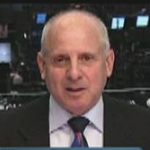1)It’s a tax. A tax on bank capital housed at a central bank that someone has to eat, either the bank itself or they pass it on to their clients. Taxes aren’t stimulative.
2)It would blow up the $4 Trillion money market industry as money would flee and this money finances government repo’s, commercial paper, CD’s, etc…
3)It would damage bank profitability, which is the blood of small and medium sized business lending and a big help to large ones that also have access to capital markets. To remind you, the Japanese Topix bank stock index is down 92% in nominal terms since its peak in 1989. The Euro STOXX bank stock index is down by 89% from its 2007 high.
4)We’re seeing in Europe that banks have passed on some of the tax on to retail deposits. There is a story today on BN that UBS is offering some of its high net worth clients a payment holiday for a few months from paying the negative rate penalty for keeping money at the bank. They are doing this because money is leaving the bank.
5)It hurts insurance companies and pension funds that have little low risk options in meeting their investment return goals.
6)It crushes the saver and retiree.
7)It has created a massive bubble in sovereign bonds that will be a complete mess when reversed considering the large debt taken on that NIRP encourages.
8)It therefore becomes a trap for central banks because of the potential damage to bond prices when unwinding it.
9)The Swedish Riksbank saw the error of its negative rate ways and got its benchmark rate back to zero, but only zero. Even the BoJ realized the damage done as they stopped at a negative rate of .10% years ago.
LINK HERE to the Article
Disclaimer: The views or opinions expressed in this blog post may or may not be representative of the views or opinions of the Financial Repression Authority.





 06/15/2020 - Spanish: Alejandro Tagliavini – ¿Quedarse líquido en blue, estilo Doña Rosa?
06/15/2020 - Spanish: Alejandro Tagliavini – ¿Quedarse líquido en blue, estilo Doña Rosa?









